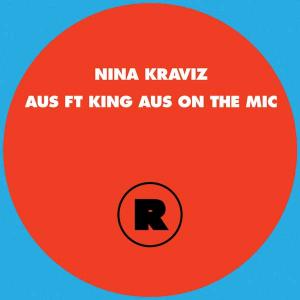Nina Kraviz Aus
On the mic. This is a phrase that can easily strike panic into the hearts […]

On the mic. This is a phrase that can easily strike panic into the hearts of any respectable house-music fan, as imaginations run wild with cringe-inducing thoughts of hip-house atrocities. It was definitely the first thing that came to mind when seeing that Siberian deep-house maven Nina Kraviz‘s latest single, “Aus,” featured King Aus… on the mic. Well, your shoulders can relax, because the finished product is a tasteful spoken-word dance meditation, something fine-tuned for late-night dancefloors and fit to be counted alongside tracks like DJ Le Roi and Roland Clark’s “I Get Deep”—a classic that Get Physical just re-released with a new batch of remixes (none of which rival the original). Granted, “Aus” may not quite be on that level, but it is a faithful recreation of an earlier era in house music.
With King Aus’ declarations to “free your mind” and “release yourself,” Kraviz’s original harkens back to house music’s more spiritual days, when parties like Body & SOUL and artists like Osunlade thrived, a time when the music was as much of a communal force as it was four-on-the-floor stimulus. In that spirit, Aus states, “the dancers are really the ones that push the beat,” his bassy monotone incantations riding over a beat that would make Charles Webster proud while deft Rhodes work from Kraviz adds both bluesy call-and-response flourishes and a church-like warmth. It’s been awhile since a track has gone so far to harness house music’s higher calling, but Kraviz has done it here.
For all the delicate qualities Kraviz brings to the nuanced cadence of “Aus,” the accompanying remixes are ever-so-slightly heavier handed—but are no less dynamic in their treatment of the source material. British producer The Rhythm Odyssey adds just the punchy touch the track needs to really have an impact in a club, funking up the beat with heavier kicks, vintage Chicago bass, and a healthy injection of 303 acid, leaving Aus’ vocal refrains mostly intact. His interpretation takes you back just like the original does, but to a different place in time—maybe even multiple places if you count the roller-rink-disco coda he tacks on at the end. The last-minute addendum adds such a great new aspect to his remix, it’s a bummer that it comes so late in the game. It’s almost an afterthought that, fleshed out further, could have become a potent remix all its own.
Rekids frontman Matt Edwards and DJ Qu are also on hand to stretch things out into deep, melodic affairs. Cool synth chords lend Edwards’ stripped down rerub an ethereal quality as layers of percussion klack and stutter along, the Radio Slave man acting as techno’s Lee “Scratch” Perry, singling out funk squawks, tribal calls, and the echoing shutter of a camera as auxiliary percussion to play prominently over an otherwise dubwise treatment. Qu, on the other hand, moves the farthest away from the original, leaving only ghostly traces of its verses and whispers of its inspired aura. It’s got a rich groove, laced in equal parts with Detroit-style drum patterns and atmospherics akin to those favored by Dixon, Âme, and the Innervisions label. Qu’s take is also the record’s most hypnotic inclusion, adding much-needed futuristic diversity to the package, especially since the original evokes such strong nostalgia right out of the gate.

